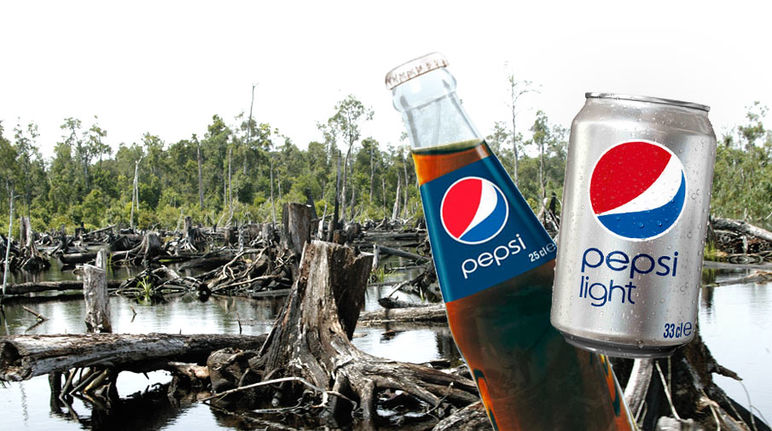PepsiCo: trashing rainforests for 450,000 tons of palm oil a year
 PepsiCo is not letting the rainforest stand in the way of its palm oil needs.<br>(photos: Jay Ullal, PepsiCo; montage: Rainforest Rescue) (© Jay Ullal, Pepsico, Montage: Rettet den Regenwald)
PepsiCo is not letting the rainforest stand in the way of its palm oil needs.<br>(photos: Jay Ullal, PepsiCo; montage: Rainforest Rescue) (© Jay Ullal, Pepsico, Montage: Rettet den Regenwald)
Pepsi's slogan Live for Now perfectly reflects how the company treats the planet – without the slightest regard for tomorrow. But we have the power to change that. Tell PepsiCo to get deforestation out of its snack foods!
Call to actionTo: PepsiCo Chairperson and CEO Indra Nooyi
“Tell PepsiCo to get deforestation out of its supply chain!”
U.S. food and beverage giant PepsiCo consumes huge amounts of palm oil produced on rainforest land for its snack foods.
In 2013, Rainforest Action Network called on the twenty largest manufacturers of snack foods to stop buying conflict palm oil. Some companies, such as Kellogg and Mars, took a first step in the right direction and made a commitment to that effect – PepsiCo simply carried on, business as usual.
More than 450,000 tons of palm oil go into PepsiCo products – mostly Frito-Lay snack foods – every year. It's up to us as consumers to tell them what we think about this and vote with our wallets.
As we saw in March, PepsiCo managers will bow to public pressure if it is strong enough. At the time, the corporation made a commitment not to tolerate land grabbing in its supply chain. The key issue back then was sugar. But it wasn't until 272,000 people supported an Oxfam petition that PepsiCo finally responded – lagging far behind its competitors.
PepsiCo should be leading the industry. With sales of $65 billion, it's the world’s second largest snack food company. Join us in calling on CEO Indra Nooyi to eliminate palm oil from PepsiCo's supply chain.
LetterTo: PepsiCo Chairperson and CEO Indra Nooyi
Dear Ms. Nooyi,
As a consumer, I am concerned about the use of palm oil in PepsiCo’s products.
Other snack food manufacturers have taken a first step in the right direction by committing to eliminate deforestation and human-rights abuses in their supply chains, but not PepsiCo. Why not?
I call on you to take the wishes of consumers the world over into account and eliminate palm oil from your products.
Sincerely,
The issue – rainforest on our dinner tables and in our fuel tanks
At 66 million tons annually, palm oil is the most commonly produced vegetable oil. Its low world market price and properties that lend themselves to processed foods have led the food industry to use it in half of all supermarket products. Palm oil can be found in frozen pizzas, biscuits and margarine, as well as body creams, soaps, makeup, candles and detergents.
Few people realize that almost half of the palm oil imported into the EU is used as biofuel. Since 2009, the mandatory blending of biofuels into motor vehicle fuels has been a major cause of deforestation.
Oil palm plantations currently cover more than 27 million hectares of the Earth’s surface. Forests and human settlements have been destroyed and replaced by “green deserts” containing virtually no biodiversity on an area the size of New Zealand.
The impact – suffering and death in producer countries, climate havoc
The warm, humid climate of the tropics offers perfect growth conditions for oil palms. Day after day, huge tracts of rainforest in Southeast Asia, Latin America and Africa are being bulldozed or torched to make room for more plantations, releasing vast amounts of carbon into the atmosphere. As a consequence, Indonesia – the world’s largest producer of palm oil – temporarily surpassed the United States in terms of greenhouse gas emissions in 2015. With their CO2 and methane emissions, palm oil-based biofuels actually have three times the climate impact of traditional fossil fuels.
Palm oil is not only bad for the climate: As their forest habitat is cleared, endangered species such as the orangutan, Borneo elephant and Sumatran tiger are being pushed closer to extinction. Smallholders and indigenous people who have inhabited and protected the forest for generations are often brutally driven from their land. In Indonesia, more than 700 land conflicts are related to the palm oil industry. Human rights violations are everyday occurrences, even on supposedly “sustainable” and “organic” plantations.
As consumers, we are largely unaware of these broader issues, yet our daily palm oil consumption also impacts our health: refined palm oil contains large amounts of harmful fatty acid esters that are known to damage DNA and cause cancer.
The solution – a revolution on our dinner tables and in our fuel tanks
Only 70,000 orangutans still roam the forests of Southeast Asia, yet the EU’s biofuels policy is pushing them to the brink of extinction. Every new plantation on Borneo is destroying a further piece of their habitat. Stepping up the pressure on policymakers is a must if we want to save our tree-dwelling kin. Apart from that, however, there is still a lot we can do in day-to-day life.
Follow these simple tips to recognize, avoid and combat palm oil:
- Enjoy a home-cooked meal: Use your imagination: why not try almond-coconut-pear biscuits? Or pizza with potato and rosemary? A meal cooked from fresh ingredients beats processed foods containing palm oil every time. Oils such as sunflower, olive, rapeseed or flaxseed are ideal for cooking and baking.
- Read labels: As of December 2014, labeling regulations in the EU require food products to clearly indicate that they contain palm oil. However, in the case of non-food items such as cosmetics and cleaning products, a wide range of chemical names may still be used to hide the use of palm oil. A quick check of your favorite search engine will turn up palm oil-free alternatives, however.
- Remember that the customer is king: Ask your retailers for palm oil-free products. Write product manufacturers and ask them why they aren’t using domestic oils. Companies can be quite sensitive to issues that give their products a bad name, so inquiring with sales staff and contacting manufacturers can make a real difference. Public pressure and increased awareness of the problem have already prompted some producers to stop using palm oil.
- Sign petitions and write your elected representatives: Online campaigns put pressure on policymakers responsible for biofuels and palm oil imports. Have you already signed all of Rainforest Rescue’s petitions?
- Speak out: Protest marches and creative action on the street raise public and media awareness of the issue, which in turn steps up the pressure on policymakers.
- Leave your car at home: Whenever you can, walk, ride a bicycle or use public transport.
- Be informed and inform others: Big Business and governments would like us to believe that biofuels are good for the climate and that oil palm plantations are sustainable. Spread the word – share this information with your family and friends and encourage them to rethink their consumption habits. It’s in our hands!













 Recent successes
Recent successes